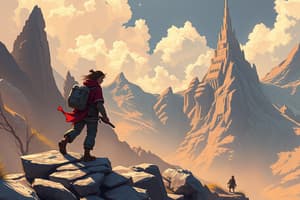Podcast
Questions and Answers
Which era marked the invention of the printing press by Johannes Gutenberg?
Which era marked the invention of the printing press by Johannes Gutenberg?
- Industrial Revolution
- Renaissance (correct)
- Enlightenment Era
- Middle Ages
What was one of the earliest forms of mass communication mentioned in the text?
What was one of the earliest forms of mass communication mentioned in the text?
- Printed Media
- Radio
- Oral Tradition (correct)
Which technology revolutionized mass communication in the 20th century?
Which technology revolutionized mass communication in the 20th century?
- Telegraph
- Printing Press
- Radio (correct)
- Telephone
What impact did the printing press have on spreading information?
What impact did the printing press have on spreading information?
Which publication was among the first to reach a mass audience?
Which publication was among the first to reach a mass audience?
Which technological advancements changed communication between individuals and across vast distances prior to radio and television?
Which technological advancements changed communication between individuals and across vast distances prior to radio and television?
What major development in mass media occurred in the late 1940s and 1950s?
What major development in mass media occurred in the late 1940s and 1950s?
Which technology challenged traditional broadcasting methods in the latter half of the 20th century?
Which technology challenged traditional broadcasting methods in the latter half of the 20th century?
What platforms rose to prominence in the early 21st century, changing how individuals consume information?
What platforms rose to prominence in the early 21st century, changing how individuals consume information?
Which aspect of mass media had a significant impact on shaping American culture in the mid-20th century?
Which aspect of mass media had a significant impact on shaping American culture in the mid-20th century?
How did the digital revolution alter communication in the latter half of the 20th century?
How did the digital revolution alter communication in the latter half of the 20th century?
What new possibilities did the World Wide Web introduce for information sharing and communication?
What new possibilities did the World Wide Web introduce for information sharing and communication?
Flashcards are hidden until you start studying
Study Notes
Mass Media Through the Centuries
From ancient times to the present day, the ways we communicate have evolved tremendously, shaping societies, altering perspectives, and impacting our global connections. This journey of the mass media, spanning millennia, can be divided into several eras, each bringing its own unique form of disseminating information.
Early Mass Media: Oral Tradition and Print
The earliest form of mass communication dates back to oral traditions, where stories, news, and histories were shared through word-of-mouth and songs, often around campfires or in community gatherings. These oral traditions laid the groundwork for written language and printed media to emerge.
The invention of the printing press by Johannes Gutenberg in the 15th century marked a pivotal moment in history. Books, pamphlets, and newspapers began to spread information more rapidly and to larger audiences than ever before. Newspapers like the Relation Aller Fürnemmen und Gedenckwürdigen Historien (1605) in Germany and The Daily Courant (1702) in England were among the first to reach a mass audience.
The Rise of Broadcast Media
As the 18th and 19th centuries progressed, technology advanced at a remarkable pace. The telegraph and telephone changed communication between individuals and across vast distances. Radio and television, however, would revolutionize mass communication in the 20th century.
Radio broadcasts began in the 1920s and quickly became a powerful tool for information dissemination and entertainment. Radio enabled the spread of news, music, and dramatic performances to millions of listeners. By the mid-20th century, radio networks like the BBC and CBS had established themselves as major players in the media landscape.
Television's debut in the late 1940s and 1950s extended the reach of broadcast media even further. Millions of households could now enjoy a wide variety of programming, from news to sitcoms to sports. TV networks like NBC, ABC, and CBS dominated the airwaves, shaping American culture and influencing global perspectives.
The Digital Revolution
The latter half of the 20th century brought about the digital revolution, forever altering the way we communicate. With the invention of the internet and the advent of personal computers, new forms of media emerged, challenging traditional broadcasting methods.
The World Wide Web introduced new possibilities for information sharing and communication, allowing for a greater degree of interactivity, participation, and accessibility. Online news sources like CNN, The New York Times, and The Guardian became popular among internet users, offering a new way to stay informed.
Social media platforms like Facebook, Twitter, and Instagram rose to prominence in the early 21st century, changing the way individuals consume, produce, and share information. Today, over 4 billion people worldwide use social media, creating a powerful and influential force in shaping public opinion and communication.
The Future of Mass Media
The evolution of mass media continues to accelerate as technology advances at an unprecedented pace. Artificial intelligence, virtual reality, and mixed reality technologies are poised to revolutionize the way we communicate and consume information. As we venture into this new age of media, it remains to be seen how these innovations will shape our societies, economies, and cultures.
In conclusion, the history of mass media demonstrates how human ingenuity, creativity, and the thirst for connection have driven the development of new and innovative ways to communicate. As we continue to explore the frontiers of media, it is both exciting and challenging to envision the future of mass communication and the stories it will tell.
Studying That Suits You
Use AI to generate personalized quizzes and flashcards to suit your learning preferences.




